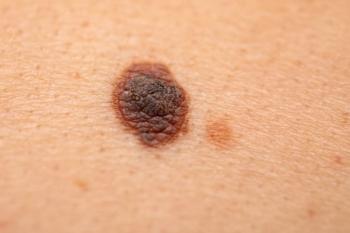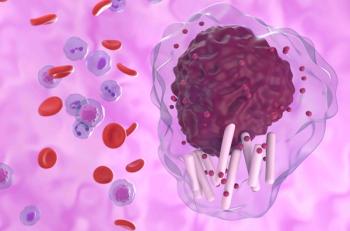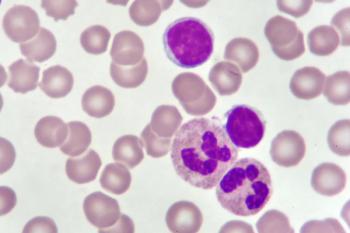
Providers
Latest News

Latest Videos

CME Content
More News

A study of adolescents with type 1 diabetes (T1D) found that real-time continuous glucose monitoring (CGM) with a predictive hypoglycemia alarm reduced the time spent below range.

A retrospective cohort study found no significant associations between phototherapy without psoralens and the risk of skin cancer.

An early-phase, dose-escalation study of a hypofractionated approach to concurrent chemoradiation using an an adaptive stereotactic ablative radiotherapy (SABR) boost showed promising results in patients with locally advanced, unresectable non–small cell lung cancer (NSCLC).

More research is necessary to understand cerebral oxygen consumption as a predictive biomarker for brain atrophy in multiple sclerosis (MS); however, this study found that mitochondrial dysfunction could have a role in the underlying pathophysiology of MS.

A single-institutional cohort study found that in patients with melanoma, regressive status could be used as a valuable predictive marker of prognosis and response to systemic therapy.

What Happens to Patients With Diabetes When Semaglutide Dosing Is Disrupted? Dr Ian Neeland Explains
Possible long-term consequences for patients with diabetes forced to switch to alternative medications during the semaglutide shortage include the risk of losing ground in glycemic control, having uncontrolled diabetes with associated symptoms, and other adverse events.

Findings from the phase 3 SEQUOIA trial favored zanubrutinib over bendamustine plus rituximab in most biomarker-based subgroups of patients with chronic lymphocytic leukemia (CLL) or small lymphocytic lymphoma (SLL) without deletion of the 17p chromosome.

According to Ian Neeland, MD, there are 2 main reasons for the shortage of injectable semaglutide: the fact that oral semaglutide has not yet been tested for weight loss, and that most practitioners just overlook it as an option.

A genetic association study evaluated the relationship between anorexia nervosa and various sleep traits, indicating potential avenues for future research on the link between circadian rhythms and eating disorders.

A retrospective study showcases the need for considering the impact of skin cancers in non-Hispanic American Indian/Alaska Native communities, who experience some of the highest incidences of melanoma in the US.

Ian Neeland, MD, highlights that oral semaglutide is more accessible and that patients should avoid switching drug types during the shortage.

Margaret Liang, MD, MSHPM, gynecologic oncologist and health services researcher and director, Gynecologic Oncology Fellowship Program, Cedars-Sinai Cancer Center, discusses financial toxicity in cancer care and how institutions can help alleviate the financial burden for patients.

This retrospective cohort study demonstrates the heightened risks individuals with actinic keratoses have for developing skin cancers.

A prospective analysis suggested that those with pediatric-onset multiple sclerosis (MS) who experienced earlier disease-modifying treatment initiation may be less vulnerable to disease progression.

The Center on Health Equity and Access delivers current news, highlights research advancements, and continuous initiatives focused on addressing health care disparities and improving overall accessibility to exceptional care.

A Finnish study found maternal type 1 diabetes (T1D) to be associated with a significantly higher risk of any congenital heart defect (CHD) in offspring, and that maternal overweight or obesity was associated with certain CHDs in offspring.

Updated Guidelines Expand Lung Cancer Screening Eligibility for At-Risk Patients: Dr Melinda Aldrich
Melinda C. Aldrich, PhD, MPH, associate professor in the departments of medicine, thoracic surgery, and biomedical informatics at Vanderbilt University, discussed recently updated lung screening guidelines from the American Cancer Society and the importance of equity across populations as new guidelines are developed.

An abstract presented at the 2023 American Society of Hematology Annual Meeting and Exposition suggests that patients with chronic lymphocytic leukemia (CLL) treated in the era of novel agents might be less likely to experience Richter transformation compared with those treated prior to this era.

Michael Gieske, MD, director of lung cancer screening at St. Elizabeth Health Care, discusses disparities in lung cancer incidence and mortality that the Rural Appalachian Lung Cancer Screening Initiative aims to address.

Ian Neeland, MD, of University Hospitals Harrington Heart & Vascular Institute, describes challenges patients with diabetes face during the semaglutide shortage and alternative options he gives his patients to prevent therapy disruptions.

A population-based study drew a possible connection between gastrointestinal (GI) symptoms and the multiple sclerosis (MS) prodrome.

The most-read content from the 2023 American Society of Clinical Oncology (ASCO) Annual Meeting including the latest findings in ongoing clinical trials, a panel discussion on Medicare oncology payment models, and the importance of alignment between clinicians and payers on clinical pathways.

Patients who had cataracts, age-related macular degeneration, and/or glaucoma were at an increased risk of falling and sustaining fractures.

A retrospective study found that instances of recurrent pulmonary hypertension due to vascular reocclusion or restenosis were extremely uncommon after balloon pulmonary angioplasty.

This qualitative study conducted interviews with caregivers of patients with spinal muscular atrophy (SMA) to explore their unique experiences and challenges in navigating health systems to access disease-modifying therapies.














